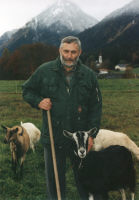Although the immediate crisis over the approval of the Commission by the European Parliament has been defused by the decision of controversial Italian commissioner, Rocco Buttiglione, to stand down, this has not removed the shadow hanging over the nominee for agriculture commissioner, Mariann Fischer Boel. Press reports identified her as a controversial member of Mr Barosso's team who might have to be reshuffled.
Her troubles date from an indifferent performance in front of the European Parliament's agriculture committee. She seemed to be nervous and subdued. In general the hearing was characterised by bland answers as the commissioner designate failed to get to grips with a series of targeted and specific questions fired at her by MEPs. Fischer Boel was understandably reluctant to box herself in by taking a clear stance on controversial issues. However, as a consequence, she was attacked by the Parliament for a lack of 'rigour' in defending the CAP.
The three hour cross-examination was not without its bizarre moments. Dutch Green MEP Kartika Liotard whipped out a picture of a pig being castrated without anaesthetic to press home a point on animal welfare. In response, Mrs Fischer Boel declared that she was 'not a specialist on pigs', but thought there must be rules about pig castration somewhere.
She was at her most spirited when attempts were made to revive accusations about conflicts of interest given that her husband is a farmer. French MEP Jean Claude Martinez laid into her with an attack on her impartiality, demanding to know how much money her family drew down in EU subsidies. She responded, 'I've never concealed that I'm married to a farmer and I've never considered that as a disadvantage for the post.'
The Commission earlier decided that there was no conflict of interest with her farming assets in Denmark, but she faced further criticism when the Danish newspaper
Politiken claimed that she failed to divulge details of her husband's financial investment in a farm in Russia. It was also revealed that, as farm minister, she had failed to declare to the Danish parliament that she had shares in Danisco, large sugar producer in Denmark. Fischer Boel sold the estimated €13,000 worth of shares just before she declared her financial interests to the Commission.
The European Parliament Committee's judgement on her performance effectively damned her with faint praise. The committee's chair wrote to the Parliament's president to say that overall she could do an 'adequate' job. However, she would have to fight 'more actively to defend the interests of European farmers.' Some of us might think that her principal duty is to European taxpayers and consumers, or to the environment and the food processing industry, rather than to protect the interests of farmers.
In a profile of Fischer Boel,
European Voice has revived an awkward incident in 2003. Ivar Hansen, the married chairman of the Danish parliament, died from a heart attack in the early hours while visiting Fischer Boel at her apartment in Copenhagen. It sparked rumours in the Danish press that the two were having an affair and Fischer Boel was forced to issue a press release in which she spoke of a 'very close' relationship. At least it's the first time, after years of overweight males in the job, that a farm commissioner has been associated with a hint of tabloid scandal.
Franz Fischler was such an effective farm commissioner that he was always going to be a hard act to follow and one can understand why Fischer Boel would want to play safe until she was in the job. Meanwhile, the delay in approving the Commission has meant that Fischler has had to postpone a well earned holiday and stay on in a caretaker role.


